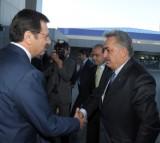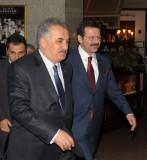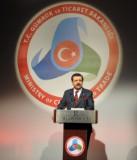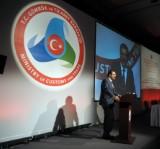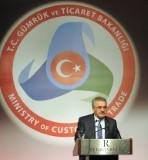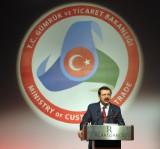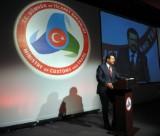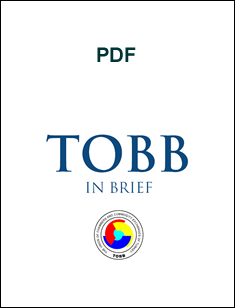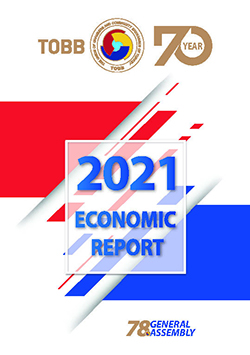The global production center has shifted to the Asia-Pacific
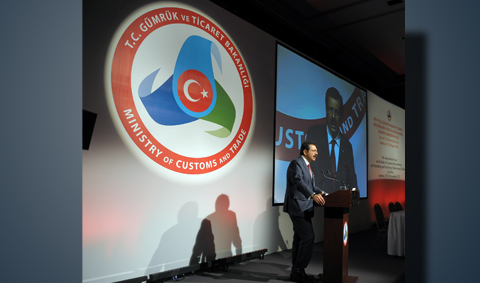
29.11.2012 / İstanbul
Speaking at the 5th International Forum on “The Role of Customs Agencies in the Facilitation and Development of Trade among Silk Road Countries,” TOBB President M. Rifat Hisarcıklıoğlu stated that the production center of the world has shifted to the Asia-Pacific region in the last 20 years and that the revitalization of the historic Silk Road has become a very real possibility rather than a dream.
Hisarcıklıoğlu said that the developments over the last 20 years have prompted a need for the revitalization of the Silk Road and for the countries on the Silk Road to integrate into the global economic system and went on, “On one of the Silk Road is the driving force of the global economy’s growth, China; on the other end is the European Union, still the world’s largest market despite many crises. The strategic basins of the global system – the Gulf, Caspian, Black Sea and the Eastern Mediterranean- are located on this historic road. A magnificent geography, full of riches, is once again drawing closer in on itself.”
In his speech during the opening of the Forum, TOBB President M. Rifat Hisarcıklıoğlu said, “The increasing capacity and decreasing wait times at customs gates are saving our traders and industrialists over 200 million USD yearly.”
Hisarcıklıoğlu emphasized that once the planned transportation projects are actualized and the use of modern TIR fleets and trains becomes widespread in the region’s ports, intra-region trade will increase and the private sector will become stronger.
The TOBB President said, “The whole world will support peace and security in countries through which the routes of global transportation pass. Then, in order to make our countries prosper and enjoy peace, this project provides us with golden opportunities.”
- Customs legislations which are unable to address the needs of the times
Emphasizing that in order to bring the Silk Road to its former glory and to integrate it into the global system, Hisarcıklıoğlu said that trade in the region needs to be facilitated, obstacles to trade be removed, the development of the private sector be supported and the investment environment needs to be ameliorated, “The biggest obstacle in our path are the frozen disagreements on the Silk Road, ungainly bureaucracy, customs legislations which are unable to address the needs of the times, the lack of development of transportation lines and the lack of modernization of customs gates.”
Stating that the steps taken in Turkey in the last 10 years should provide an example to the region in regards to the removal of obstacles, Hisarcıklıoğlu reported that they have given three day training on the TIR System, the backbone of land transportation, to the opinion leaders in the land transportation sector of Afghanistan.
- Customs are now more modern
Reminding that a TOBB affiliate has been undertaking the modernization of customs gates, Hisarcıklıoğlu said, “We have shouldered the whole financial burden of modernizing the infrastructure. We have brought down the customs wait times to almost half of what they used to be. Drivers waiting so much less at the gates translate into savings and reduce costs.”
Stating that customs authorities are conducting controls in much more modern environment as well, Hisarcıklıoğlu said, “Until today, Kapıkule, Greece, Bulgaria, Iraq, Georgia and Syria customs gates have been modernized. The increased capacity of the customs gates and reduced wait times are traders and industrialists savings on their exports over 200 million USD yearly.”
- Efforts to remove obstacles
Stating that they are actualizing the İstanbul-Tehran-Islamabad Container Train Project as per the Economic Cooperation Organization with Iran and Pakistan, Hisarcıklıoğlu said that they are working to remove obstacles on the line in these three countries.
Hisarcıklıoğlu said, “Today, we can get up on the podium and tell each other things like ‘let’s remove bureaucratic obstacles,‘ or ‘let’s develop the infrastructure,’ which we’ll soon forget. However, our perspective of work should be built on ‘cooperation built on tangible projects’. We must see each other not as competitors but as the complementary factors of the Silk Road.”
After the opening speeches, overseen by the Customs and Commerce Minister Hayati Yazıcı, the signing ceremony for a Letter of Intent between Georgia, Azerbaijan, Tatary, Kyrgyzstan and Turkey as well as the joint declaration between Iran, Pakistan and Turkey.
- Customs and Commerce Minister Hayati Yazıcı
Customs and Commerce Minister Hayati Yazıcı emphasized during his speech that the Silk Road was not just a simple trade route, “In the future, the center of production will once again be Asia. Today, of the approximately 30 trillion USD total world export volume, 22% of it is to be found in Silk Road countries. The trade volume of these countries has increased to four times its former size in the last ten years.”
Yazıcı stated that for the revitalization of the region, the strengthening of the Silk Road is crucial, “History will be written here once again. The Silk Road countries are akin to the links of a chain.”
Your message has been sent
Thank you |
